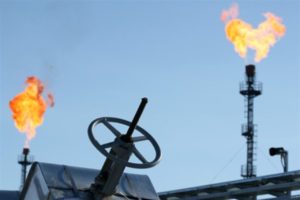
Smart Energy group, following the results of drilling and overhaul projects, has reached the daily production of natural gas in the amount of one million cubic meters (mcm), the press service of the group has said.
Among the successful well overhaul projects, Smart Energy noted the decommissioning of well No. 1 in Ostroverkhivske gas condensate field (Kharkiv region), located in the license area of Ukrgazvydobuvannia.
As reported, in 2019 the group plans to invest about UAH 1 billion in the increase of natural gas production.
Earlier, in January 2019, the group announced that it had reached a historic daily maximum of 960,000 cubic meters of gas.
Smart Energy is a management company that is part of Vadim Novinsky’s Smart-Holding. It is engaged in the implementation of projects in the field of hydrocarbon production and alternative energy.

Deputy Head of the State Forest Resources Agency of Ukraine Volodymyr Bondar has proposed that the Forestries and Wood Industry Ministry is created, the press service of the agency has reported.
“Having a separate ministry, we will be able to bring the forest industry to a high level,” Bondar said at the fourth congress of foresters of Ukraine.
He added that the State Forest Resources Agency does not have the right to initiate legislation to speed up the resolution of a number of issues, in particular, the separation of economic and control functions, the fight against illegal logging, the drying up of forests, and the creation of a timber market.
According to the deputy head of the agency, the creation of the ministry will make it possible to develop a national forest policy, conduct a forest inventory and properly finance all work in forestries.
As reported, enterprises of the State Forest Resources Agency of Ukraine in 2018 saw UAH 466.1 million in net profit, and their net revenue rose by 23%, to UAH 16.8 billion. Enterprises of the agency logged 16.5 million cubic meters of wood and produced goods made of wood for UAH 3.139 billion.
According to the national budget for 2019, UAH 614.7 million will be provided to the State Forest Resources Agency, including UAH 462 million for forestries and hunting, protection of forests in the forest fund.
The total space of forest areas of Ukraine is almost 10.4 million hectares. The forest cover of Ukraine is 15.9%. The State Forest Resources Agency manages 7.6 million hectares of forests (73% of the forest fund of Ukraine).

It is unlikely that the presidential and parliamentary elections to be held this year would affect the speed of the implementation of reforms in Ukraine, according to most participants of the CFA Society Ukraine Investment Forum held in Kyiv on Friday, March 15.
According to its express poll, 58.33% of the audience backed the above opinion and 62.944% confirmed it during the repeated voting after the information panel.
However, 15.74% and 21.68% of the participants during the repeated voting said that the reforms would accelerate. Some 17.59% (11.91%) and 8.33% (4.2%) respectively expected that the reform would slow down and would be backtracked.
According to Economist of Morgan Stanley investment bank Alina Sliusarchuk, judicial reform is currently the key reform for Ukraine.
“The first question that investors usually ask me is not about the labor market or even about the war in the east of the country. It concerns the fight against corruption, judicial reform, the presence of structural changes. That is, this is the most important issue,” she said at the forum.
Chief Economist at the Dragon Capital investment group Olena Belan said that the intentions and aspirations of the new authorities would very quickly manifest themselves in the macroeconomic situation.
“Regardless of who will be elected, if the new government continues cooperating with the International Monetary Fund, adhering to the correct policy, rather than making populist decisions, there is a potential for reducing the key policy rate by 2 or 3 percentage points,” she said.
Executive Director of Blazer International Foundation Oleh Ustenko has the same opinion. He said that the success of the new government will directly depend on whether they are based on expert opinion.
“I am sure that in Ukraine the situation will really improve if each of the existing candidates who intends to lead the country will follow the instructions prepared by the experts. Of course, the person who is elected to this position is important, but society and international partners are unlikely to allow future head of state to significantly deviate from the course of reform,” he said.
About 300 financial and investment experts took part in the ninth CFA Society Ukraine Investment Forum.

PJSC Viola pharmaceutical factory (Zaporizhia) received UAH 29.381 million in net profit in 2018, which is 147.7% more than in 2017 (UAH 11.863 million).
According to a company report in the information disclosure system of the National Commission on Securities and the Stock Market, the company’s assets in 2018 increased by 24%, to UAH 150.892 million.
Viola pharmaceutical factory was established in 1944. It produces medicinal plant raw materials in packs and filter bags, herbal teas, spirit tinctures, extracts, syrups, oils and oil solutions, alcohol solutions, aqueous solutions, ointments, gels, medical powders, and other products.
The ultimate beneficiary of the plant is Vitaliy Sofiychenko.